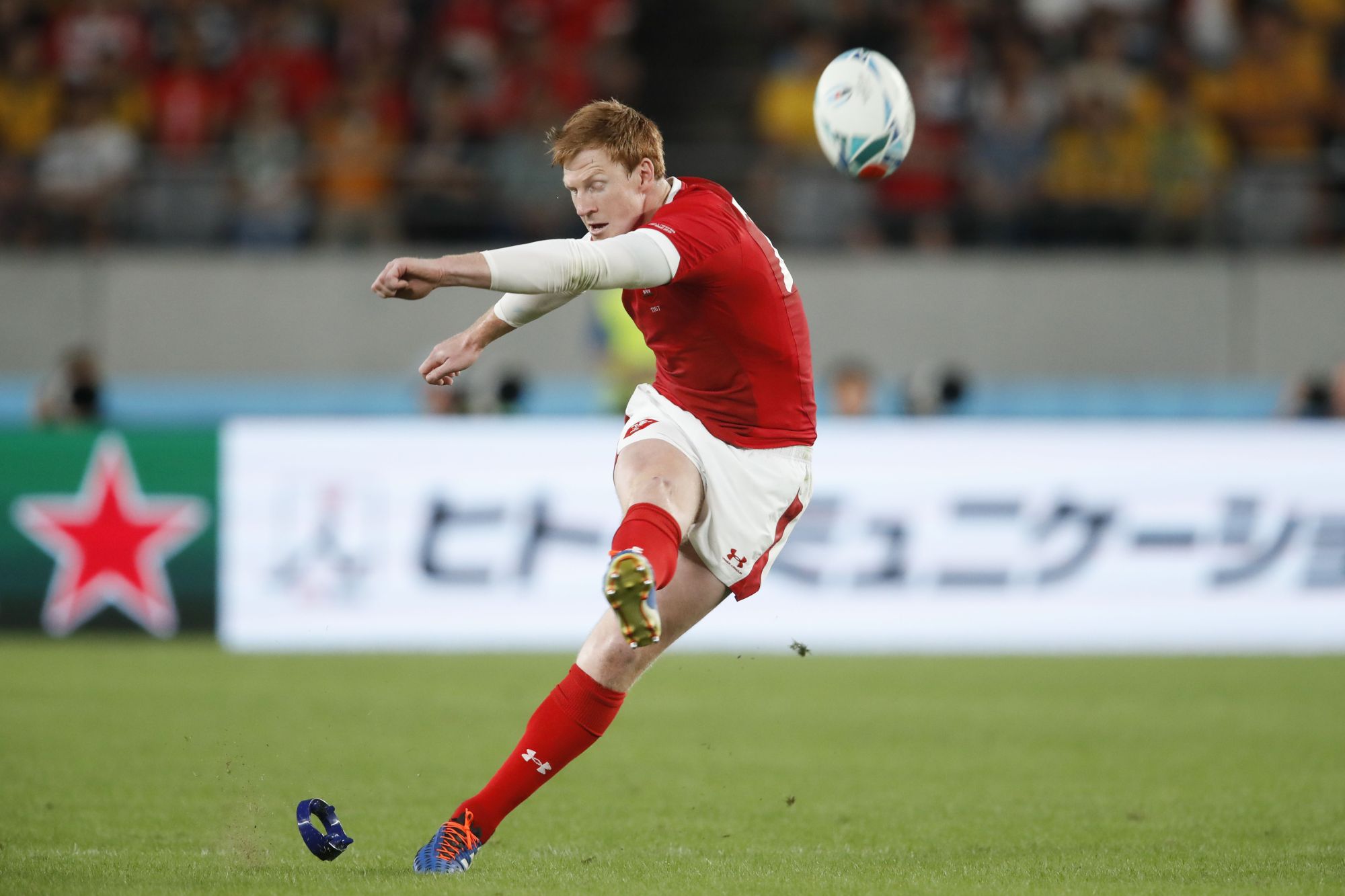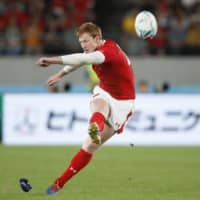Wales super-sub Rhys Patchell hailed his team's kicking prowess after beating Australia on Sunday, claiming "tries don't win World Cups."
The Welsh held off a fierce second-half fightback from the Wallabies to claim a 29-25 win at Tokyo Stadium, taking control of Pool D with their second victory of the tournament.
Wales won the match despite scoring only two tries to Australia's three. Starting standoff Dan Biggar landed a drop goal and a conversion before being forced off the field in the 28th minute after failing a head injury assessment, and replacement Patchell picked up the baton with two penalties, a conversion and a drop goal of his own after coming on.
Biggar's drop goal came after 35 seconds — the fastest ever in Rugby World Cup history — and Patchell believes such clinical kicking could make all the difference when the last two teams standing meet in the final in Yokohama on Nov. 2.
"You get to a World Cup and everyone thinks that tries win World Cups," said Patchell. "Tries don't win World Cups. Goalkicking and being able to take three points when they appear is really important.
"You look at it historically, in 2003, 2007, 2011 — it's probably really only in 2015 that the All Blacks ran away with the game and were able to put a bit of light between them and Australia in the final. As kickers, we talk about how you've got to be ready for those opportunities."
Biggar's early drop goal gave Wales a lead it never relinquished for the rest of the game, although the score was close until two Patchell penalties and a converted try from Gareth Davies in the last 10 minutes of the first half gave Wales a 15-point cushion.
Patchell's drop goal shortly after the restart further stretched Wales' advantage, only for Australia to come roaring back with tries from Dale Haylett-Petty and Michael Hooper and a penalty from Matt Toomua that took the Wallabies to within a point with just over 10 minutes remaining.
Patchell kicked another penalty to ultimately take Wales clear, and Australia winger Adam Ashley-Cooper believes the Wallabies' first-half performance left them with too much to do after the break.
"I think what we really needed to focus on was our discipline," said Ashley-Cooper, who scored Australia's first try in the 21st minute. "In terms of our attack and our ruck detail, and holding on to the ball a little longer in the first half. It was the little inaccuracies that hurt us, and you can't really afford to be inaccurate at a Rugby World Cup against a quality team like Wales."
Ashley-Cooper started the match only because Australia head coach Michael Cheika had been denied the services of Reece Hodge, who was suspended for three games following what was deemed a dangerous tackle on Fiji's Peceli Yato in the Wallabies' opening match.
Cheika had been vocal in his dissatisfaction with that ruling, and a further incident in Sunday's match left him "embarrassed" by referee Romain Poite and television match official Ben Skeen's judgement.
Wallabies center Samu Kerevi was penalized for leading with his forearm after Patchell attempted to tackle him from a very high position, and an exasperated Cheika claimed after the game that "administrators are spooking the referees" with their directives on how to officiate games.
"It was pretty funny because I thought I'd seen that tackle before," said Cheika. "It could have been Reece Hodge. When our guy makes that tackle and has the high-tackle framework in his head, he gets suspended. But when this guy doesn't think about the high-tackle framework, we get penalized. As a former player, I'm embarrassed about that. I don't know the rules any more, honestly."
Wales head coach Warren Gatland was diplomatic in his response to the incident and preferred to reflect instead on his team's second win of the tournament, having started with a dominant 43-14 victory over Georgia.
"I think this squad have grown up in terms of their game management," said Gatland. "That's improved significantly, and it was good in the autumn last year and particularly the Six Nations. We'd learned a lot from those experiences, with guys coming off the bench and giving us impact.
"We showed some real character under pressure in that second half. There were a couple of key turnovers that we got toward the end of the game. It was pleasing. For us, it was a challenge because we had a six-day turnaround. Georgia wasn't an easy encounter, and to pick the same team is a real challenge for us. So I thought that, even though we were under a lot of pressure in that second half, our composure and our fitness levels were really good."
Wales now has a 10-day break before it plays Fiji in Oita on Oct. 9, while Australia returns to action against Uruguay, in the same city, on Oct. 5.




